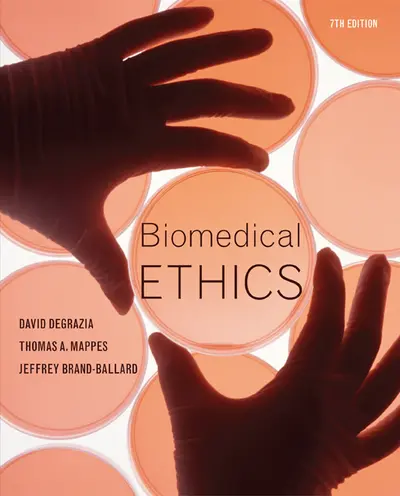My Account Details

ISBN10: 0073407453 | ISBN13: 9780073407456

* The estimated amount of time this product will be on the market is based on a number of factors, including faculty input to instructional design and the prior revision cycle and updates to academic research-which typically results in a revision cycle ranging from every two to four years for this product. Pricing subject to change at any time.
Instructor Information
Quick Actions (Only for Validated Instructor Accounts):
This best-selling anthology of readings with case studies provides insightful and comprehensive treatment of ethical issues in medicine. Appropriate for courses taught in philosophy departments, bioethics programs, as well as schools of medicine and nursing, the collection covers such provocative topics as biomedical enhancement, clinical trials in developing countries, animal research, physician-assisted suicide, and health care reform. The text's effective pedagogical features include chapter introductions, argument sketches, explanations of medical terms, headnotes, and annotated bibliographies.
Preface Chapter 1: General IntroductionChapter 2: The Professional-Patient RelationshipChapter 3: Contested Therapies and Biomedical EnhancementChapter 4: Human and Animal ResearchChapter 5: Death and Decisions Regarding Life-Sustaining TreatmentChapter 6: Suicide, Physician-Assisted Suicide, and Active EuthanasiaChapter 7: Abortion and Embryonic Stem-Cell ResearchChapter 8: Genetics and Human ReproductionChapter 9: Social Justice and Health-Care Policy
Chapter 2: The Professional-Patient RelationshipChapter 3: Contested Therapies and Biomedical EnhancementChapter 4: Human and Animal ResearchChapter 5: Death and Decisions Regarding Life-Sustaining TreatmentChapter 6: Suicide, Physician-Assisted Suicide, and Active EuthanasiaChapter 7: Abortion and Embryonic Stem-Cell ResearchChapter 8: Genetics and Human ReproductionChapter 9: Social Justice and Health-Care Policy
Chapter 4: Human and Animal ResearchChapter 5: Death and Decisions Regarding Life-Sustaining TreatmentChapter 6: Suicide, Physician-Assisted Suicide, and Active EuthanasiaChapter 7: Abortion and Embryonic Stem-Cell ResearchChapter 8: Genetics and Human ReproductionChapter 9: Social Justice and Health-Care Policy
Chapter 6: Suicide, Physician-Assisted Suicide, and Active EuthanasiaChapter 7: Abortion and Embryonic Stem-Cell ResearchChapter 8: Genetics and Human ReproductionChapter 9: Social Justice and Health-Care Policy
Chapter 8: Genetics and Human ReproductionChapter 9: Social Justice and Health-Care Policy
Need support? We're here to help - Get real-world support and resources every step of the way.